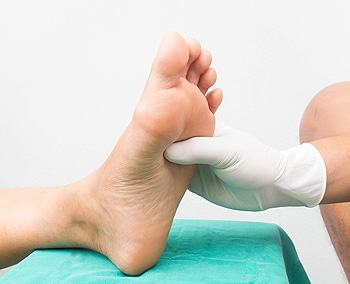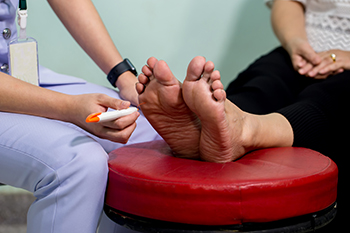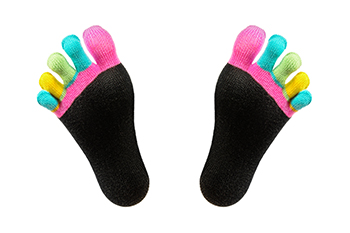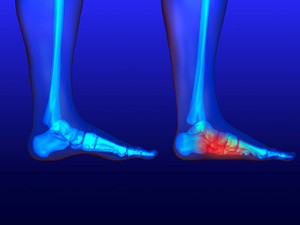Kirksville (660) 665-9000
September 2023
Preventing Problems and Promoting Wellness in Diabetic Patients

For individuals living with diabetes, foot care is not just a luxury but a critical component of their overall health. Diabetes can lead to a variety of foot problems that, if left unattended, may result in severe complications. One common issue is neuropathy, which causes a loss of sensation in the feet. This makes it important to inspect the feet daily for cuts, blisters, or sores that may otherwise go unnoticed. Poor circulation is another concern, as it impairs the body's ability to heal foot wounds. Therefore, it is essential to keep the feet warm and well-protected. Wearing shoes that fit properly and have ample cushioning and arch support are vital to preventing pressure points and ulcers. It is beneficial to schedule regular visits to a podiatrist as part of a diabetic person's healthcare routine to monitor and address any emerging problems. If you have diabetes, it is strongly suggested that you contact this foot doctor who can help you to manage this condition.
Diabetic foot care is important in preventing foot ailments such as ulcers. If you are suffering from diabetes or have any other concerns about your feet, contact Deborah Holte, DPM from Northeast Missouri Foot Clinic. Our doctor can provide the care you need to keep you pain-free and on your feet.
Diabetic Foot Care
Diabetes affects millions of people every year. The condition can damage blood vessels in many parts of the body, especially the feet. Because of this, taking care of your feet is essential if you have diabetes, and having a podiatrist help monitor your foot health is highly recommended.
The Importance of Caring for Your Feet
- Routinely inspect your feet for bruises or sores.
- Wear socks that fit your feet comfortably.
- Wear comfortable shoes that provide adequate support.
Patients with diabetes should have their doctor monitor their blood levels, as blood sugar levels play such a huge role in diabetic care. Monitoring these levels on a regular basis is highly advised.
It is always best to inform your healthcare professional of any concerns you may have regarding your feet, especially for diabetic patients. Early treatment and routine foot examinations are keys to maintaining proper health, especially because severe complications can arise if proper treatment is not applied.
If you have any questions please feel free to contact our office located in Kirksville, MO . We offer the newest diagnostic and treatment technologies for all your foot and ankle needs.
Causes and Treatment of Foot Neuropathy

Neuropathy in the feet is a complex and often debilitating condition that affects millions of people worldwide. It refers to damage or dysfunction of the peripheral nerves, leading to a range of distressing symptoms. These can include numbness, tingling, and burning sensations, in addition to sharp pains in the feet. The causes of neuropathy in the feet are diverse, with diabetes being a leading factor. Other potential triggers include alcohol abuse, certain medications, and infections. Additionally, autoimmune diseases and traumatic injuries can contribute to developing neuropathy. Early detection is important, as untreated neuropathy can lead to severe complications, such as foot ulcers. Effective treatment approaches depend on the underlying cause. Managing blood sugar levels and lifestyle modifications are essential for reducing the effects of diabetic neuropathy. Medication, such as pain relievers, may be prescribed to alleviate symptoms. Early intervention and a comprehensive treatment plan can help manage neuropathy, improving the quality of life for those affected. If you are affected by foot neuropathy, it is strongly suggested that you visit a podiatrist who can guide you toward effective relief and treatment options.
Neuropathy
Neuropathy can be a potentially serious condition, especially if it is left undiagnosed. If you have any concerns that you may be experiencing nerve loss in your feet, consult with Deborah Holte, DPM from Northeast Missouri Foot Clinic. Our doctor will assess your condition and provide you with quality foot and ankle treatment for neuropathy.
What Is Neuropathy?
Neuropathy is a condition that leads to damage to the nerves in the body. Peripheral neuropathy, or neuropathy that affects your peripheral nervous system, usually occurs in the feet. Neuropathy can be triggered by a number of different causes. Such causes include diabetes, infections, cancers, disorders, and toxic substances.
Symptoms of Neuropathy Include:
- Numbness
- Sensation loss
- Prickling and tingling sensations
- Throbbing, freezing, burning pains
- Muscle weakness
Those with diabetes are at serious risk due to being unable to feel an ulcer on their feet. Diabetics usually also suffer from poor blood circulation. This can lead to the wound not healing, infections occurring, and the limb may have to be amputated.
Treatment
To treat neuropathy in the foot, podiatrists will first diagnose the cause of the neuropathy. Figuring out the underlying cause of the neuropathy will allow the podiatrist to prescribe the best treatment, whether it be caused by diabetes, toxic substance exposure, infection, etc. If the nerve has not died, then it’s possible that sensation may be able to return to the foot.
Pain medication may be issued for pain. Electrical nerve stimulation can be used to stimulate nerves. If the neuropathy is caused from pressure on the nerves, then surgery may be necessary.
If you have any questions, please feel free to contact our office located in Kirksville, MO . We offer the newest diagnostic and treatment technologies for all your foot care needs.
Pros and Cons of Toe Socks for Runners

If you are a runner who has been plagued by toe blisters, toe socks may be the solution. Toe socks, those unique glove like counterparts to traditional socks, are designed for various sports, including running and hiking. Wearing toe socks can reduce friction and wick moisture from the toes. They also provide space for the toes to splay, which can improve your foot's muscle engagement while running. Additionally, wearing toe socks may even lower the risk of repetitive stress injuries. Toe socks are surprisingly comfortable, despite their unusual appearance. Wearing toe socks while running has a few less desirable traits. They take up more room in your shoes due to the separation of each toe, which may call for different shoe sizing and fit. Putting on toe socks can be a bit time consuming, and the effort required to work each toe into its individual pouch may feel like an inconvenience. In addition, toe socks for running are more costly than regular running socks. This is because they require more fabric and have a more intricate design. Despite this, they may be worth the investment to prevent blisters, discomfort, and other injuries. For more information on the benefits or problems with wearing toe socks, it is suggested that you consult with a podiatrist.
Exercising your feet regularly with the proper foot wear is a great way to prevent injuries. If you have any concerns about your feet, contact Deborah Holte, DPM of Northeast Missouri Foot Clinic. Our doctor will treat your foot and ankle needs.
How to Prevent Running Injuries
Many common running injuries are caused by overuse and overtraining. When the back of the kneecap starts wearing out and starts causing pain in your knee, this is commonly referred to as runner’s knee. Runner’s knee is a decrease in strength in your quadriceps and can occur if you’re not wearing properly fitted or supporting shoes. To prevent runner’s knee, focusing on hip strengthening is a good idea, as well as strengthening your quads to keep the kneecaps aligned.
What Are Some Causes of Running Injuries?
- One cause of a common running injury is called iliotibial band syndrome.
- Plantar fasciitis is also another common injury.
- Stress fractures can occur from overtraining, lack of calcium, or even your running style.
Best Ways to Prevent Running Injuries
- Wear footwear that fits properly and suits your running needs.
- Running shoes are the only protective gear that runners have to safeguard them from injury.
- Make a training schedule. Adding strengthening exercises as well as regular stretching can help keep you strong and limber and can lessen the possibility of injuries.
- Stretching keeps muscles limber; this will help you gain better flexibility.
If you have any questions please feel free to contact our office located in Kirksville, MO . We offer the newest diagnostic and treatment technologies for all your foot and ankle needs.
Running With Flat Feet

Running is a pursuit that empowers both body and mind, regardless of foot arch type. Flat feet, often misunderstood, should not deter anyone from lacing up and hitting the track. There are various types of flat feet, each requiring a unique approach. Flexible flat feet involve arches that appear when one is off the foot, and rigid flat feet exhibit little to no arch, even when lifted. While some flat feet do not pose issues, others may lead to discomfort or pain during running. Wearing customized footwear with proper arch support is essential. Orthotics or insoles can aid in maintaining alignment and reducing strain. Performing strengthening exercises targeting foot muscles can enhance stability. Running with flat feet is indeed possible with the right knowledge, care, and preparation. If you have flat feet and are interested in pursuing running as a hobby, it is suggested that you are under the care of a podiatrist who can provide you with useful information.
Flatfoot is a condition many people suffer from. If you have flat feet, contact Deborah Holte, DPM from Northeast Missouri Foot Clinic. Our doctor will treat your foot and ankle needs.
What Are Flat Feet?
Flatfoot is a condition in which the arch of the foot is depressed and the sole of the foot is almost completely in contact with the ground. About 20-30% of the population generally has flat feet because their arches never formed during growth.
Conditions & Problems:
Having flat feet makes it difficult to run or walk because of the stress placed on the ankles.
Alignment – The general alignment of your legs can be disrupted, because the ankles move inward which can cause major discomfort.
Knees – If you have complications with your knees, flat feet can be a contributor to arthritis in that area.
Symptoms
- Pain around the heel or arch area
- Trouble standing on the tip toe
- Swelling around the inside of the ankle
- Flat look to one or both feet
- Having your shoes feel uneven when worn
Treatment
If you are experiencing pain and stress on the foot you may weaken the posterior tibial tendon, which runs around the inside of the ankle.
If you have any questions please feel free to contact our office located in Kirksville, MO . We offer the newest diagnostic and treatment technologies for all your foot and ankle needs.





